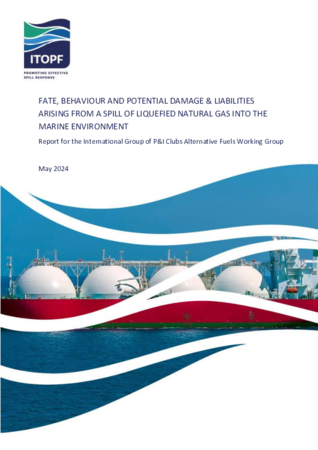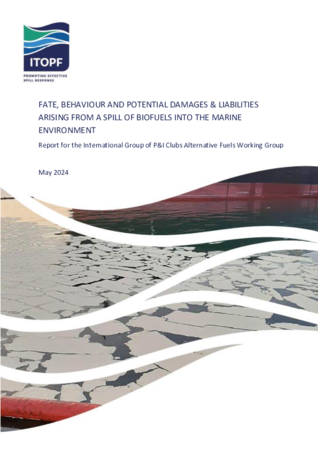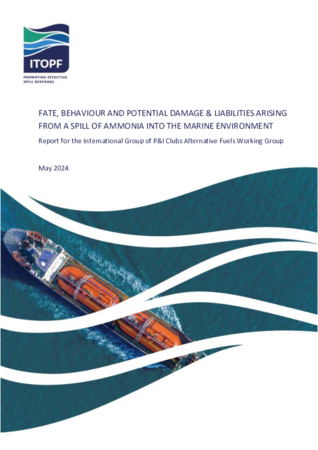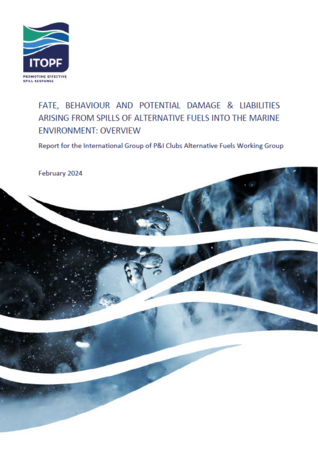Alternative Fuels
The push for decarbonisation in shipping is driven by multiple factors, including the Paris Agreement, the International Maritime Organisation's (IMO) goals, and by a change in public opinion, pushing investors and charterers to fasten their energy transition.
As the IMO's goal of reducing total emissions from marine shipping by 50% by 2050 creeps closer, new alternative fuels are emerging to help the industry meets this target.
While the fate, behaviour, potential hazards and impacts of oil spills are well-known, many alternative fuels are not as widely understood.
In a series of reports drafted for the International Group of P&I Clubs Alternative Fuels Working Group, ITOPF has investigated the fate, behaviour, hazards and the possible damage and liabilities of the following alternative fuels:
- Ammonia
- Hydrogen
- Liquefied Natural Gas (LNG)
- Liquefied Petroleum Gas (LPG)
- Biofuels (FAME and HVO)
- Methanol
- Lithium-Ion Batteries
Biofuels behave in a similar way to conventional hydrocarbons, with similar mechanisms for damage such as coating and smothering of wildlife, habitats and property. However, with higher rates of biodegradation and therefore less persistence than conventional hydrocarbons, impacts to environmental and socio-economic receptors are likely to be reduced.
Gaseous alternative fuels such as ammonia, hydrogen, LNG and LPG behave very differently and are significantly less persistent in the marine environment. Instead of widespread, longer term environmental damage associated with conventional hydrocarbon spills, these fuels present acute, short term and localised ecological impacts and potentially significant health and safety risks from their hazardous properties (cryogenic damage, toxicity, flammability and explosivity). Although methanol is not gaseous at ambient conditions, it is a volatile, flammable liquid, fully miscible with water and, if not ignited, will be rapidly lost to the atmosphere from its vapours and to water through dissolution. The risks associated with lithium-ion batteries are related to possible thermal runaway if damaged, presenting fire risks and explosion as well as potential harm in surrounding areas from toxic gas.
Overall, except for biofuels, traditional oil clean up techniques are inappropriate for the alternative fuels and response focusses on detection and monitoring through modelling, remote sensing techniques, as well as prevention and control of fire. National authorities should adapt their contingency plans and preparedness programme to capture the new challenges posed by these alternative fuels, as they become more common at sea.
Explore ITOPF's reports on Alternative Fuels
Fate, Behaviour, Potential Damage & Liabilities Arising from a Spill of Methanol in the Marine Environment
This report focuses on methanol as a non-traditional marine fuel. Methanol is considered to be a promising low-carbon fuel for the shipping industry, as it is easier to store than ammonia, LNG or hydrogen with low tank-to-wake emissions. However, well-to-tank emissions, upstream CO2 emissions from the production, transportation, transformation and distribution of the fuel to the vessel, vary depending on the source of hydrogen used to synthesise the methanol. Currently, methanol is primarily produced from natural gas, which has a high carbon intensity. Methanol from fossil sources such as natural gas and coal are referred to as grey methanol and brown methanol respectively. Methanol from fossil sources with carbon capture and storage (CCS) is labelled as blue methanol and CO2 emission-free methanol from biomass sources or renewable electricity is labelled as green methanol.
Categories: Alternative Fuels, Papers
Fate, Behaviour, Potential Damage & Liabilities Arising from a Spill of LPG in the Marine Environment
This report focuses on LPG (Liquefied Petroleum Gas) as a non-traditional marine fuel. LPG is by definition any mixture of propane and butane in liquid form and is obtained during the refining process of crude oil. LPG has been shipped globally in bulk within LPG gas carriers for more than 80 years, resulting in significant experience in handling and transporting via ship. There are currently 72 LPG carriers that are using LPG for propulsion, while 93 carriers and four ethane carriers are currently on the orderbooks with capacity to use LPG as bunker fuel. However, the experience of handling this substance is currently confined to those within the LPG industry due to the LPG gas carrier fleet dominating bunker use. As the number of vessels with the ability to use LPG as fuel increase, an increased likelihood of incidents occurring during handling, transportation, and loading/unloading operations exists.
Categories: Alternative Fuels, Papers
Fate, Behaviour, Potential Damage & Liabilities Arising from a Spill of LNG in the Marine Environment
This report focuses on Liquefied Natural Gas (LNG) as a non-traditional marine fuel. LNG has been shipped globally in bulk for more than sixty years, therefore there is experience in handling and transporting, both in tank trucks and in gas carriers. LNG is considered as a viable ‘transition’ or ‘bridging’ fuel as, when burned, it emits significantly less carbon dioxide and other harmful pollutants than persistent fuel oils. LNG has an abundant global supply, and also has established infrastructure in place for bunkering. As significant industry experience exists for this fuel type, there is a more established understanding and knowledge of material compatibility and the safety requirements necessary to reduce risks of spills/leaks in comparison to other more technically immature fuel types.
Categories: Alternative Fuels, Papers
Fate, Behaviour, Potential Damage & Liabilities Arising from a Shipping Incident Involving a Li-ion Battery Powered Vessel
This summary report focuses on Li-ion Batteries as a non-traditional method of marine propulsion. Li-ion batteries are becoming increasingly prevalent in many industries, with applications ranging from small electronic devices to electric scooters, electric vehicles (EVs) and to larger energy storage units. Li-ion batteries have been shipped in packaged form and/or as part of electric vehicles for many years. They are now a viable option for energy storage systems in the shipping industry, particularly for smaller vessels. Use of battery propulsion reduces or removes the need for traditional bunkering of traditional oils or alternate fuels i.e. ammonia, hydrogen, LNG, methanol etc.
Categories: Alternative Fuels, Papers
Fate, Behaviour, Potential Damage & Liabilities Arising from a Spill of Hydrogen in the Marine Environment
This report focuses on hydrogen as a non-traditional marine fuel, more specifically compressed hydrogen and liquid hydrogen (LH2). Hydrogen has been viewed as a viable option for shipping’s decarbonisation journey as it is one of the few alternative fuels that can be classed as ‘emission-free’ (only is the hydrogen is produced by the electrolysis of water using renewable energy, i.e. ‘green hydrogen’). The use of hydrogen as a fuel for shipping can be used in multiple states, such as liquefied or compressed hydrogen within internal combustion engines or using LH2 within fuel cells. Due to the economic and technical barriers facing hydrogen technology and infrastructure development, the industry is immature when compared to other marine alternative fuels and therefore these technologies may develop in the future, with one format potentially being more technically viable than others.
Categories: Alternative Fuels, Papers
Fate, Behaviour, Potential Damage & Liabilities Arising from a Spill of Biofuels in the Marine Environment
This report focuses on biofuels as a non-traditional marine fuel. Biofuel is a generic term used to describe fuels produced directly or indirectly from organic material, including vegetable oils, other plant materials and animal waste (but not from fossilised organic material, as with traditional fuel oils). Biofuels are seen as viable ‘transition fuels’ as, although not being zero-carbon, their upstream life cycle emission levels (also know as ‘well to tank’ emissions for fossil-derived fuels) are significantly lower than conventional hydrocarbon fuels because they are typically produced from renewable feedstocks.
Categories: Alternative Fuels, Papers
Fate, Behaviour, Potential Damage & Liabilities Arising from a Spill of Ammonia in the Marine Environment
This report takes a look into Ammonia as an alternative shipping fuel. Ammonia is considered to be a promising low- or zero-carbon fuel for the shipping industry, as it is easier to store than LNG or hydrogen and does not have any tank-to-wake emissions, meaning that it does not have any direct CO2 emissions when combusted on-board. However, well-to-tank emissions, upstream CO2 emissions from the production, transportation, transformation and distribution of the fuel to the vessel, vary depending on the source of hydrogen used to synthesise the ammonia.
Categories: Alternative Fuels, Papers
Overview: Fate, Behaviour and Potential Damage & Liabilities Arising from Spills of Alternative Fuels into the Marine Environment
ITOPF, as part of the International Group of P&I Clubs Alternative Fuels Working Group, has been requested to provide a series of brief summary documents to describe the expected fate and behaviours of emerging alternative fuels and to outline the possible damage and liabilities that may arise from incidents involving vessels carrying these fuels as bunkers.
Categories: Alternative Fuels, Papers








